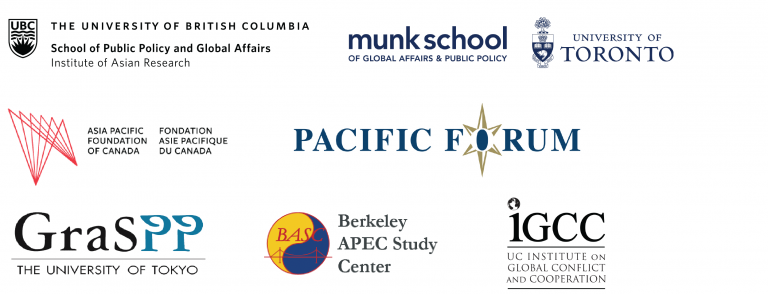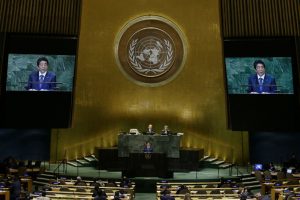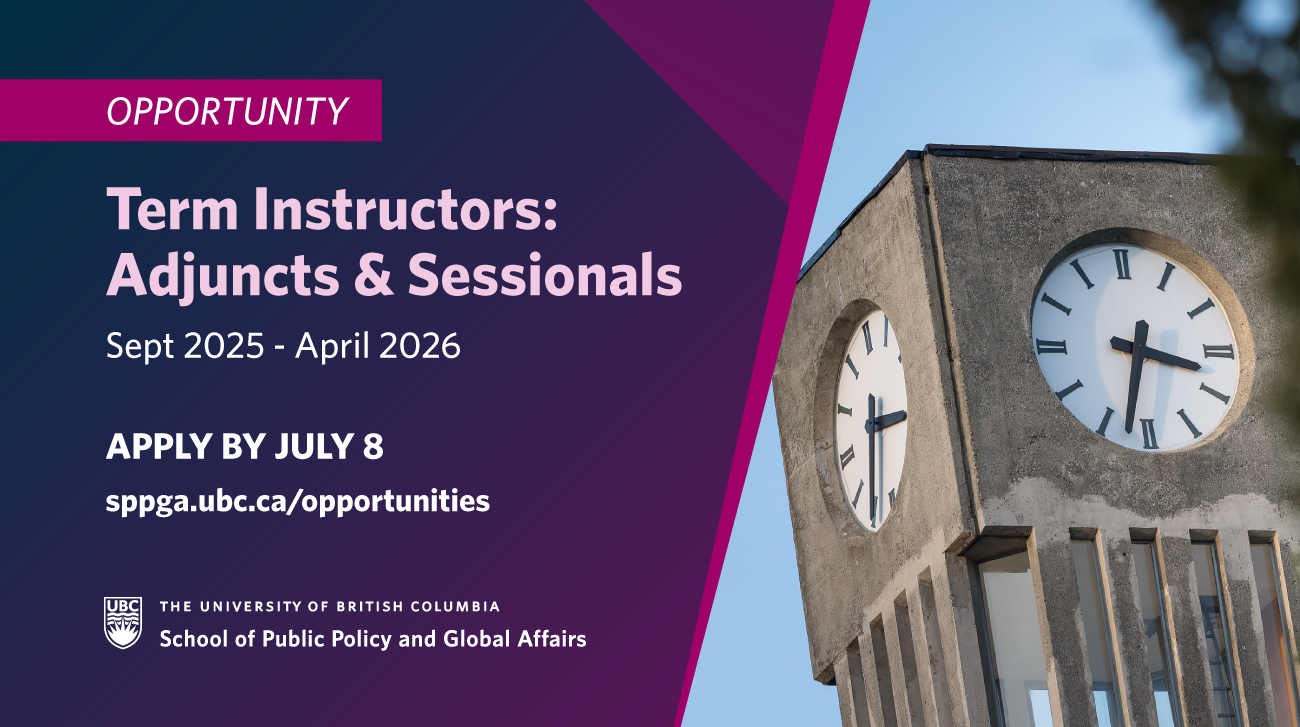
Japan’s Leadership in the Liberal International Order: Impact and Policy Opportunities for Partners
Since 2016, Japan has shown remarkable leadership on several dimensions of global and regional economic governance, including trade governance, economic and data governance, regional rules-based order, and environmental governance. How significant is this new phase of Japanese international leadership in historical perspective? What factors are driving this new global leadership? What are implications for Japan’s partners, including Canada, and the US?
Editor & Contact Point: Yves Tiberghien, Co-Director, Centre for Japanese Research and Professor of Political Science, UBC
Introduction and Key Takeaways
Contributors: Yves Tiberghien, Vinod K. Aggarwal, Alan Alexandroff, Saori Katada, Masahiro Kawai, Phillip Lipscy, Crystal Pryor, Jeff Reeves, Mireya Solis, Harukata Takenaka
Keynote Speech from His Excellency Ambassador Kawamura Yasuhisa
Papers
• T.J. Pempel, University of California, Berkeley: “Japan Caught in the Economic-Security Dilemma”
• Harukata Takenaka, GRIPS: “New Normal: Proactive Japan and Transformed Domestic Politics”
• Joseph Caron, Honorary Professor, UBC, and Former Ambassador of Canada to Japan: “Will There Be a Shared Canada-Japan Foreign and Security Policy Agenda for the New Decade?”
• Alan Alexandroff, Munk School, University of Toronto: “Between the Old and the New: Can Japan Help Lead the Way to a New Liberal Order?”
• Leslie Armijo, SFU: “Structure or Agency? Japan’s Leadership Options Through an Outsider’s Eyes”
• Vinod Aggarwal, University of California, Berkeley: “Toward a Bipolar Economic Order? U.S. Trade Strategy in the 21st Century”
• Mireya Solís, Brookings Institution: “Rescuing Trade Multilateralism: Japan’s Mission Impossible?”
• Grace Jaramillo, APF Canada: “The CPTPP: A Key Strategic Advantage for Japan to Advance Its Leadership in the Pacific”
• Yves Tiberghien, UBC: “Rules and Order as National Interest: Explaining Japan’s Leadership in the CPTPP and Other Trade Initiatives”
• Hiroki Takeuchi, Southern Methodist University: “Is the Liberal International Order Dead? Global Value Chains and the CPTPP”
• Phillip Lipscy, Munk School, University of Toronto: “Japan and International Organizations in the Liberal International Order”
• Masahiro Kawai, University of Tokyo, Economic Research Institute for Northeast Asia, and Former ADBI Dean: “Global Economic Governance: A Japanese Perspective”
• Saori Katada, University of Southern California: “Partnership for Quality Infrastructure: Developmentalism or New Liberal Order?”
• Jeffrey Kucharski, Royal Roads University: “Japan, FOIP, and the Geopolitics of Energy in the Indo-Pacific”
• Kristi Govella, University of Hawaii at Manoa: “Crafting Policy for Contested Commons: Insights from Japan’s Approach to the Outer Space, Cyberspace, and Maritime Domains”
• Sayuri Romei, Public Policy Fellow, Wilson Center: “From Mediator to Leader? Japan’s Expanding Strategic Horizons and Steps Toward Global Leadership”
About the Authors
Alan S Alexandroff is the Director of the Global Summitry Project at the Munk School of Global Affairs and Public Policy at the University of Toronto as well as the Editor of Global Summitry. The Journal includes several podcast series including the ‘Now’, ‘Summit Dialogue’ and ‘Shaking the Global Order’ series. Dr. Alexandroff has long manned the blog post Rising BRICSAM. Dr. Alexandroff focuses his research work on the contemporary global governance architecture. His most recent article is: ‘Liberal Theory, liberal context and the G20’ a chapter in the edited volume by Steven Slaughter, The G20 and International Relations Theory. Edward Elgar. 2019.
Leslie Elliott Armijo is Associate Professor, School for International Studies, Simon Fraser University, and an expert on large emerging powers, especially in Latin America and South Asia. Recent publications include “The Political Economy of Development Finance in Latin America” (Oxford Research Encyclopedias, 2020); “The Monetary and Financial Powers of States: Theory, Dataset, and Observations on the Trajectory of American Dominance” (New Political Economy, 2020); The BRICS and Collective Financial Statecraft (Oxford 2018); Unexpected Outcomes: How Emerging Economies Survived the Global Financial Crisis (Brookings 2015); and “Can International Relations and Comparative Politics be Policy Relevant? Theory and Methods for Incorporating Political Context” (Politics & Policy 2015).
Mireya Solís is the Director of the Centre for East Asian Policy Studies (CEAP), Philip Knight Chair in Japan Studies, and senior fellow in the Foreign Policy program at Brookings. Prior to her arrival at Brookings, Dr. Solís was a tenured associate professor at American University's School of International Service. Dr. Solís is an expert on Japanese foreign policy, US-Japan relations, international trade policy, and Asia-Pacific economic integration. Dr. Solís earned a doctorate in government and a master's in East Asian studies from Harvard University and a bachelor's in international relations from El Colegio de México. Her latest book Dilemmas of a Trading Nation: Japan and the United States in the Evolving Asia-Pacific Order received the 2018 Ohira Masayoshi Memorial Award.
Joseph Caron is a Distinguished Fellow of the Asia Pacific Foundation of Canada and a Professor and Honorary Research Associate at the Institute of Asian Research of the University of British Columbia. He is a former Canadian High Commissioner to India and former Canadian Ambassador to China and Japan. He has also previously been responsible for coordinating Canada’s activities at major international summits, such as the G8. He serves on the Board of Directors of Manulife Financial Corporation.
Sayuri Romei is a Public Policy Fellow at the Wilson Center in Washington, DC, where she researches Japan's nuclear policy. Prior to that, she was the Fellow for Security and Foreign Affairs at Sasakawa Peace Foundation USA for two years, and a MacArthur Nuclear Security Pre-doctoral Fellow at Stanford University’s Center for International Security and Cooperation (CISAC). Her doctoral work focuses on Japan’s nuclear hedging posture and examines how the country started and maintained such a stance throughout the postwar era. She holds a BA in English Literature from Sorbonne University, a BA in International Relations from the University of Roma La Sapienza, an MA in International Relations from Roma Tre University, and a PhD in Political Science from Roma Tre University. Starting in September 2020, Romei will join the RAND Corporation as a Stanton Nuclear Security Fellow.
Grace Jaramillo is a Postdoctoral Research Fellow and Lecturer at UBC, Department of Political Science, and currently Expert Advisor on Global Value Chains at the Asia Pacific Foundation. After earning her PhD from Queen’s University, she won a SSHRC Postdoctoral Fellowship to study institutional spillovers of Free Trade Agreements in the Americas spending the first year at the Balsillie School of International Affairs at University of Waterloo, and then moving to Vancouver to complete her research studying the CPTPP negotiations. Her doctoral dissertation versed around the political economy of industrial policy, studying the institutional transition from traditional industrial policy to horizontal ones centered around cluster development and global value-chains.
Harukata Takenaka is a professor at the National Graduate Institute for Policy Studies (GRIPS) in Tokyo. He holds a PhD from Stanford University and a Bachelor of Laws from the University of Tokyo. His key research areas are the role the prime minister in Japanese politics, the role of the second chamber, and democratization in pre-war Japan. He previously worked for the Minister of Finance in Japan in the International Finance Bureau from April 1993 to June 1995. Prof. Takenaka’s recent publications include: Failed Democratization in Prewar Japan (Stanford University Press 2014), Futatsu no Seiken Kotai [Two Changes of Government] (Tokyo: Keiso Shobo, 2017); “Expansion of the Japanese prime minister’s power in the Japanese parliamentary system: Transformation of Japanese politics and the institutional reforms” (Asian Survey, September 2019).
Vinod “Vinnie” Aggarwal is Travers Family Senior Faculty Fellow and Professor in the Department of Political Science, Affiliated Professor at the Haas School of Business, and Director of the Berkeley Asia Pacific Economic Cooperation Study Center (BASC) at the University of California at Berkeley. He is Editor-in-Chief of the journal Business and Politics. He has held fellowships from the Brookings Institution, Rockefeller Foundation, Council on Foreign Relations, East-West Center, Woodrow Wilson International Center for Scholars, and the Japan Foundation as an Abe Fellow. Dr. Aggarwal has authored or edited 21 books; his latest is Responding to the Rise of China. He has also published over 130 articles and book chapters. His current research examines comparative regionalism, industrial policy in high technology, disaster management, and the political economy of great power competition. Professor Aggarwal received his B.A. from the University of Michigan and his M.A. and Ph.D. from Stanford University.
Jeff Kucharski is an Adjunct Professor at Royal Roads University and teaches courses in the School of Business. Before retiring from the public service in 2012, he was an Assistant Deputy Minister in the Alberta Department of Energy responsible for international energy policy, strategic planning and intergovernmental relations. Prof. Kucharski spent almost half his working career in Japan in various roles including with the Seibu Group, Government of Alberta and the Federal Department of Foreign Affairs and International Trade. Prof. Kucharski is both a practitioner and an academic who aims to bring lived experience to his research and teaching. His academic research interests include international trade, energy policy, energy trade, and the geopolitics of the international energy business. He holds a Doctor of Energy Science degree from the Graduate School of Energy Science, Department of Socio-environmental Energy Science, Kyoto University in Japan and MBA and B.Com degrees from the University of Alberta.
Kristi Govella is an Assistant Professor in the School of Pacific and Asian Studies at the University of Hawaii at Manoa, an Adjunct Fellow at the East-West Center, and an Adjunct Fellow at Pacific Forum. She specializes in international relations and comparative politics in Asia, with a particular focus on the intersection of regional economic and security policy. She is currently working on a number of projects related to economics-security linkages, regional institutional architecture, trade agreements, multinational firms, Japanese politics, and the global commons. Her publications include Linking Trade and Security: Evolving Institutions and Strategies in Asia, Europe, and the United States (2013). Prior to joining the University of Hawaii, Dr. Govella was a Postdoctoral Fellow at Harvard University and an Associate Professor at the Daniel K. Inouye Asia-Pacific Center for Security Studies. She has also been a visiting research fellow at the University of Tokyo and Waseda University. She holds a Ph.D. and M.A. in Political Science from the University of California, Berkeley and a B.A. in Political Science and Japanese from the University of Washington.
Hiroki Takeuchi is Associate Professor of Political Science at Southern Methodist University (SMU), and Director of the Sun & Star Program on Japan and East Asia in the SMU Tower Center for Public Policy and International Affairs. He received his Ph.D. of Political Science from University of California at Los Angeles (UCLA), his M.A. of Asian Studies from University of California at Berkeley, and his B.A. of Economics from Keio University in Japan. Previously, he taught at UCLA as a faculty fellow of the Political Science Department and at Stanford University as a postdoctoral teaching fellow of the Public Policy Program. His research and teaching interests include Chinese and Japanese politics, comparative authoritarian politics, and international relations and political economy of East Asia, as well as applying game theory to political science. He is the author of Tax Reform in Rural China: Revenue, Resistance, and Authoritarian Rule (Cambridge University Press, 2014).
Saori N. Katada is Professor and the Chair of Political Science and International Relations Department at University of Southern California. She is a co-author of two recent books: The BRICS and Collective Financial Statecraft (Oxford University Press, 2017), and Taming Japan’s Deflation: The Debate over Unconventional Monetary Policy (Cornell University Press, 2018). Her new book Japan’s New Regional Reality: Geoeconomic Strategy in the Asia-Pacific is forthcoming from the Columbia University Press in July 2020. Her single-authored book Banking on Stability: Japan and the Cross-Pacific Dynamics of International Financial Crisis Management (University of Michigan Press, 2001) received Masayoshi Ohira Memorial Book Award. Her Ph.D. is from the University of North Carolina at Chapel Hill (Political Science) in 1994, and her B.A. from Hitotsubashi University (Tokyo). Before joining USC, she served as a researcher at the World Bank in Washington D.C., and as International Program officer at the UNDP in Mexico City.
TJ Pempel is a Jack M. Forcey Professor of Political Science in U.C. Berkeley's Department of Political Science which he joined in July 2001. Professor Pempel's research and teaching focus on comparative politics, political economy, contemporary Japan, and Asian regional ties. His latest publications include Two Crises; Different Outcomes (Cornell University Press, 2015); “Alliances and the Future Asia-Pacific Order”, Global Asia (2016), and, with Yul Sohn, Japan and Asia’s Contested Order (Palgrave, 2019). His next book, A Region of Regimes: Prosperity and Plunder in the Asia-Pacific will be published in 2021 by Cornell University Press.
Phillip Y. Lipscy is associate professor of political science at the University of Toronto. He is also Chair in Japanese Politics and Global Affairs and the Director of the Centre for the Study of Global Japan at the Munk School of Global Affairs & Public Policy. His research addresses substantive topics such as international cooperation, international organizations, the politics of energy and climate change, international relations of East Asia, and the politics of financial crises. He has also published extensively on Japanese politics and foreign policy. Lipscy’s book from Cambridge University Press, Renegotiating the World Order: Institutional Change in International Relations, examines how countries seek greater international influence by reforming or creating international organizations. Lipscy obtained his Ph.D. in political science at Harvard University. He received his M.A. in international policy studies and B.A. in economics and political science at Stanford University.
Masahiro KAWAI is the Representative Director of the Economic Research Institute for Northeast Asia (ERINA) and Professor Emeritus, University of Tokyo. He holds a B.A. in economics from the University of Tokyo and an M.S. in statistics and a Ph.D. in economics from Stanford University. Dr. Kawai began his professional career as a Research Fellow at the Brookings Institution and then taught economics at The Johns Hopkins University and the University of Tokyo. He also served as Chief Economist for the World Bank’s East Asia and the Pacific Region; Deputy Vice Minister of Finance for International Affairs and President of the Policy Research Institute of Japan's Ministry of Finance; a Special Advisor to the Asian Development Bank (ADB) President on regional economic integration and cooperation; and Dean of the Asian Development Bank Institute (ADBI). With his academic and policy background, his recent research focuses on Asian economic integration and cooperation, including trade and investment (CPTPP, RCEP, CJK FTA), development and connectivity (BRI, FOIP, ADB, AIIB), and money and finance (CMIM, AMRO, RMB internationalization).
Yves Tiberghien (Ph.D. Stanford University and Harvard Academy Scholar) is a Professor of Political Science, Director Emeritus of the Institute of Asian Research, and Co-Director of the Center for Japanese Research at the University of British Columbia (UBC). He is a Distinguished Fellow at the Asia-Pacific Foundation of Canada and the International Steering Committee Member representing Canada at Pacific Trade and Development Conference (PAFTAD). He is one of the Principals of the Vision20. Yves’ research focuses on the ongoing transition in the global economic and environmental order, in the face of new systemic risks, a changing balance of power, and social fragmentation. He is also currently working on articles on Japan’s and China’s roles in global and regional governance (including TPP, G20, AIIB, climate change, Belt and Road Initiative) and a book project titled Up for Grabs: Disruption, Competition, and the Remaking of the Global Economic Order.
Updated policy papers from the International Workshop organized by the Centre for Japanese Research (UBC, SPPGA, IAR) that took place January 24–25 at UBC, Vancouver, Canada.
This is a joint web publication by:
- Centre for Japanese Research, Institute of Asian Research, School of Public Policy and Global Affairs, UBC
- Centre for the Study of Global Japan and Global Summitry Project, Munk School of Global Affairs and Public Policy, University of Toronto
- Asia Pacific Foundation of Canada
- Graduate School of Public Policy, University of Tokyo
- Pacific Forum
- Berkeley APEC Study Center, University of California, Berkeley
- Institute on Global Conflict and Cooperation, University of California, San Diego




